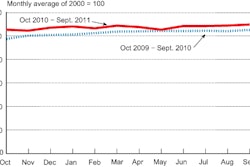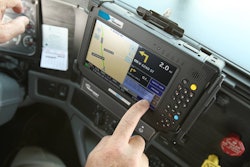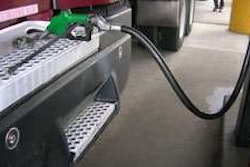It’s one of the perks of my job – getting to take a tractor-trailer down the highway through the Swedish countryside for a little taste of trucking outside U.S. borders. And you always can count on an interesting trip when you manage to land an assignment like that. Sweden is about as buttoned-down a country as you’re likely to find on this planet. Rules and regulations are the norm – on top of business and competitive issues that sound all too familiar to U.S. fleet executives.
As in the rest of Europe, cars have priority in Sweden, and it doesn’t matter how much money you paid in road and fuel taxes last year: Hours of service, vehicle lengths, weight, speed, driver pay and virtually every aspect of a truck operating there is monitored and supervised to ensure the safety of the motoring public.
Sweden is an orderly country. Its people are not fond of surprises. So their government isn’t kidding when it says it expects drivers of all types of motor vehicles – commercial or otherwise – to obey all highway laws at all times. Not surprisingly, there is zero tolerance for mistakes.
Such is life on Volvo’s home turf. But it’s instructive in that you get a real sense of where this Swedish company’s corporate culture originates. Safety is not just a catchphrase at Volvo. After a week touring Volvo factories, visiting with customers and driving their excellent cabover trucks, I understand that safety and environment concerns are embedded in the company’s DNA.
Just getting to drive a tractor-trailer on Swedish highways is a fairly big deal. Normally the law precludes anyone driving a commercial vehicle without an extensive education and examination process – but there is a loophole for “vehicle demonstrations” for manufacturers such as Volvo. I’ve got it easy: All I have to do is turn the key and go. Most Swedish truck drivers – and increasing numbers of drivers on the European continent – first have to blow into an alcohol breathalyzer tube and get a clear result before the truck will start. And the driver has to reblow in the tube any time the vehicle is switched off for longer than 30 minutes. It’s a $1,500 option and increasingly popular as a means of accident defense.
Once the vehicle is running, the driver has to insert his version of a CDL into an electronic control module located in the bulkhead above the driver’s seat. All European commercial drivers’ licenses have a computer chip built into the back of them; this chip records data from the vehicle and stores it for up to a year at a time. Everything from hours of service to GPS-based speed limit information goes onto the card. Get pulled over – it happens three or four times a year on average – and the cops swipe the card through an electronic reader to see if you’ve done anything wrong. As a result, you easily can find yourself fined for a traffic violation that occurred weeks ago – and the fines are steep, too.
And the enforcement isn’t just passive, either. At several points during my drive, I encountered road signs with a camera displayed on them; these are considered fair warning that you’re about to enter a speed zone. And if you’re going even one kilometer per hour over the posted limit, a camera aimed at the roadway will snap a picture of the vehicle and transmit it to the Swedish Highway Patrol.
Once they’ve got it, all registration records for the vehicle, as well as all associated drivers’ licenses (family and employees), are called up and examined. Once a visual match is confirmed, a ticket will be mailed to the offender. However, the police take pains to send a photograph of only the driver of the offending vehicle: The passenger is never included because there were too many instances of spouses opening the ticket up and finding a girlfriend or boyfriend along for the ride.
It simply wouldn’t make sense for Volvo to have one set of values for Sweden and one for North America. And that’s a philosophy that Volvo Trucks North America has unapologetically adhered to here in North America and will continue to do so in the future.











